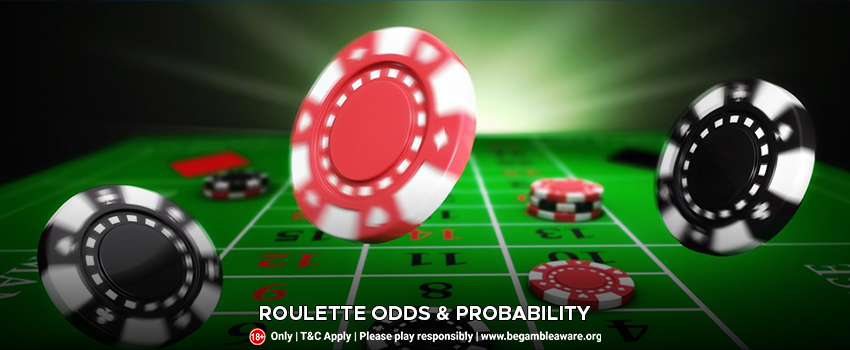Roulette Odds & Probability

Many gamers are drawn to Roulette by the prospect of fast and straightforward earnings if only their good number appears on the next ball toss. The principles of Roulette are easy to understand. Still, numerous new gamers overlook the notion that the more accessible a casino game is, the higher the house benefit over those who play it. The similar can be said for the alluring game of fortune known as Roulette.
Although the game does not demand participants to be statistical experts, they will be unable in the long term unless they thoroughly comprehend notions such as Roulette odds and probability. Although there is no foolproof technique for a roulette gamer to anticipate which number will be on the next spin, possessing a rudimentary knowledge of odds and probability can assist you in making wiser choices about which kinds of wagers to put. If you’re unfamiliar with this thrilling game of chance, keep reading for a quick overview of how possibilities and probabilities pertain to Roulette.
Probability and True Odds
Even experienced casino gamers could get the phrases “probability” and “odds” mixed up. While they are comparable regarding their utility and significance in assessing various roulette bets, they are fundamentally distinct – at least conceptually.
First and foremost, gamers must be aware that while fair and impartial, roulette wheels yield unpredictable outcomes with each spin. Simultaneously, there are only two possible results for every number from 0 to 36.
Probability
The chance of any particular occurrence is the chance of that result contrasted to all other potential possibilities. When stated as a figure, the likelihood is usually between 0 and 1 – 0 denotes that something is unlikely to happen, while 1 indicates perfect assurance. For instance, a 0.50 possibility might be used to represent equal possibilities. In Roulette, we have a sum of either 37 or 38 numbers. Thus these are the only possibilities.
Consider the single-zero roulette wheel, with only one method and 36 possibilities to lose for every integer. So, what are the chances that the ball would land on 17 in the following spin?
We could figure it out by dividing the number of chances by the total number of ways – 1/37, or 0.027. Because many individuals prefer to think of probability as a percentage, we multiply the decimal by 100 to get 2.70 per cent.
Roulette’s True Odds
We could relate probability to the concept of “odds” now that we know what it is and how it is calculated in Roulette. The term “odds” is often employed to represent the likelihood of an action happening, but it compares the variety of ways it could happen versus the number of ways it can’t. In Roulette, the Roulette odds of any number are expressed as 1:36 or 1/36, where 36 is the number of ways to lose.
When presenting the Roulette odds of a particular bet in Roulette, the odds are often reversed, showing the probabilities against succeeding. In the identical case, the Roulette odds against the number 17 are 36:1, or 36 to 1. These are regarded as “real odds,” as opposed to “casino odds,” as sure gamers refer to them. There is a significant distinction between the two concepts, which will be discussed further in the following section.
Let’s look at the chances for the red/black bet, which is perhaps the most popular in Roulette. If we bet on red, the chance is 18 out of 37, but the odds are 19:18 against us. The likelihood will be 18/37 = 0.48648648648, or 48.65 per cent in percentages.
Casino Odds
Experienced gamers consider not only their chances of gaining and the actual odds when deciding whether a roulette bet has great or terrible Roulette odds. They furthermore believe in the prospective prize. Every wager pays out differentially – the less likely a specific event is, the higher the possible payment.
It makes sense, and in an ideal universe where casinos do not need to earn revenue, each wager will payout at the same rate as the odds.
Consider the straightforward bet in European Roulette: the odds are 36 to 1 (36:1) against the player since, as previously stated, there are 36 possibilities for this bet to fail and only one opportunity to pass. The casino will be required to pay gamblers 36 to 1 to provide a return corresponding to the risk. Put another way, it is anticipated to repay the original stake, and payout worth 36 times the original stake.
How to Increase Player’s odds
Whenever it comes to Roulette, there are no dependable strategies to overcome the Roulette odds genuinely, and even if there are, they are neither accessible nor appropriate by casino norms. However, gamblers may improve their odds of succeeding by adopting a few simple rules that apply to online and land-based casinos.
First and foremost, selecting a competent roulette table is critical, and single-zero roulette games are superior to double-zero roulette games, commonly found in casinos throughout the United States. Due to the different areas on the wheel, the green 00, the house advantage in American-style Roulette is twice as high.
Conclusion
When selecting a wager, gamers must evaluate the casino Roulette odds to the genuine odds and choose a bet that brings the two near as feasible. The most appealing prizes are frequently given for wagers that the casino pays far less than their actual value. All of the excellent payouts, on the other hand, come with extremely low odds and necessitate a high level of danger tolerance.
Name: Roulette Odds & Probability
Posted On: 07/10/2021
Author: Cameron Riddell


